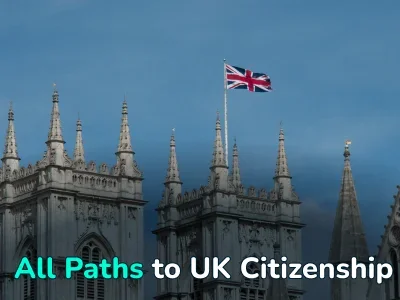
Canadian Citizenship
Foreign nationals can reside in Canada after obtaining resident status, whether temporary (TR) or permanent (PR). Obtaining TR status is relatively straightforward and granted for tourism, work, or study purposes. However, the status is lost once the study program or work contract is completed.
Obtaining PR status removes these limitations, but the resident must still meet the permanent residency requirements to maintain and renew their status. Failure to meet these criteria can also result in the loss of PR. However, residents can ease this burden by the acquisition of Canadian citizenship.
In our article, we will explore in detail what a Canada citizenship card offers, the requirements for candidates, and a step-by-step guide on how to obtain citizenship in Canada.
Benefits of Canada Citizenship
Aside from the standard rhetoric about the benefits of Сanada citizenship, like access to healthcare, education, and other government services, it is important to note that Canada allows dual citizenship, and renouncing citizenship from other countries is not required.
Advantages of Canadian citizenship:
- Live and work without restrictions. Canadian citizens have the right to move freely within Canada, choose their place of residence, and work without being tied to a specific employer or contract.
- Canadian passport. Canadian citizens can enjoy visa-free access to over 180 countries worldwide. In some cases, entry may not be entirely visa-free but simplified. For example, Canadians can visit France, Japan, Chile, Switzerland, and Australia for up to 90 days without a visa. Simplified entry often involves obtaining an electronic visa within minutes for countries like Turkey, Kenya, and Egypt, without the need for document submission or a visit to a visa center.
- Protection abroad. The Canadian government aims to protect its citizens abroad by providing diplomatic and consular assistance.
Requirements for Applying for Canadian Citizenship
Applicants must first have permanent resident (PR) status to be eligible for Canadian citizenship. However, simply holding PR status is not enough; permanent residents must fulfill all conditions associated with their status. For example, if additional medical screening was required upon arrival in Canada, this must be completed before applying for citizenship. The application is based on PR status rather than the card’s validity, so an expired PR card does not prevent an individual from applying for citizenship.
There’s a specific requirement for minimal physical presence in Canada for Canadian citizenship. Applicants must reside in the country for at least 1095 days in the five years before the date of application. The Canadian migration office has more than 1095 days of physical presence at the date of application. This helps in cases of miscalculations of absences, which may decrease the presence period. Days should be accumulated within a minimum of two years of permanent residence.
Filing Income Tax
Main Canada citizenship requirements dictate that applicants must meet specific income tax filing obligations. These requirements demonstrate that the applicant has complied with Canadian tax laws, which is crucial for maintaining eligibility for citizenship. Below is a detailed breakdown of these requirements.
Applicants must have filed personal income tax returns for at least three taxation years within the five years immediately before the date they apply for citizenship. This requirement ensures that applicants have a substantial record of financial presence in Canada, showing that they have contributed to the Canadian tax system.
Not all applicants may have been required to file taxes in Canada, depending on their employment status, residency, and income level during their time in the country. However, for those who were required to file taxes under the Canadian Income Tax Act, fulfilling this requirement is mandatory. This includes income from employment, investments, or any other taxable source in Canada.
Applicants who spent part of the required period living abroad may still need to file taxes if they were considered residents for tax purposes in any given year. This can include situations where the applicant maintained significant residential ties to Canada, such as property or family ties. They should consult a tax professional if they are uncertain about their filing obligations.
Documents Required to Apply for Canadian Citizenship
To apply for Canadian citizenship, applicants need to submit specific documents that verify their identity, residency, language proficiency, and other eligibility factors. First of all, applicants must submit the original printout of their Online Physical Presence Calculation or a completed form CIT 0407. The form confirms that the applicant has met the residency requirement by being physically present in Canada for at least 1095 days during the five years preceding the application.
Documents needed for Canadian citizenship:
- Passport copy. A color photocopy of all pages (valid or expired) of all passports or travel documents covering the five-year eligibility period is required. This includes the biographical page with the applicant’s name, photo, date of birth, and passport number. If there are gaps in documentation, applicants must explain their application form.
- Citizenship photographs. Two identical passport-sized photographs that meet Canadian citizenship photo requirements are needed. Specifics on photo size and quality are available on the official IRCC website.
- Personal identification. Applicants need two pieces of identification. Acceptable forms include: PR card (only if the second piece is Canadian government-issued, such as a driver’s license or health insurance card); driver’s license, health card, or other government-issued IDs, which may include foreign identification documents like a passport. Both sides of these documents should be photocopied if there is information on both sides.
- Fee receipt. The application fee is CAD 630 per adult (USD 465). Payment is made online, and a printed receipt must be included with the application for Canadian citizenship.
- Proof of language proficiency (for applicants aged 18–54). Applicants in this age range must provide evidence of language skills in English or French, such as: language test results from approved third-party tests (e.g., IELTS, TEF); educational transcripts or diplomas from an institution where the language of instruction was English or French; proof of Canadian language benchmark (CLB) Level 4 or higher through government-funded language training programs.
Applicants who are unable to meet language requirements for Canadian citizenship due to compassionate grounds may submit a Waiver Request Form (CIT 0116), potentially with a Medical Opinion Form for Citizenship Waivers (CIT 0547), if requesting a waiver due to a medical condition.
How to Become a Canadian Resident
Canadian citizenship is available to candidates over the age of 18 who hold permanent resident status. There are several pathways to Canadian citizenship, with the primary route being naturalization. This requires that the applicant meets specific criteria, the most important of which is having lived in Canada for at least 3 out of the last 5 years. Other ways to obtain Canadian citizenship include descent, birthright citizenship (jus soli), or through descent (jus sanguinis).
Canada Citizenship by Descent
Canada citizenship by descent allows individuals to restore or confirm their citizenship if it was lost or not properly established. The term “repatriation” is sometimes used in Canada in cases of restoring citizenship for those who were once Canadian but lost this status for various reasons.
This pathway is relevant for individuals who obtained another citizenship before 1977. In that year, Canada amended its laws to allow dual citizenship. Prior to this, Canada required individuals to renounce their Canadian citizenship if they acquired another nationality.
Documents for Canada citizenship by descent:
- Canadian birth certificate (if applicable).
- Documents showing prior citizenship (if applicable).
- Documentation explaining the loss of citizenship.
- Marriage certificates, birth certificates of children (if required).
- Identity verification documents (passport, national ID).
Applications for descent citizenship are submitted to Immigration, Refugees, and Citizenship Canada (IRCC). First, applicants must register on the official IRCC website and complete a specific form for restoring citizenship (Application to Resume Canadian Citizenship). The application fee is CAD 530 (USD 395), and digital copies of the required documents must be attached to the application.
Upon submission, applicants receive confirmation that their application is under review. Processing may take several months, depending on the complexity of the case and the workload of immigration services.
If the application is approved, the applicant is invited to take the citizenship oath at a ceremony. This is a mandatory step for all applicants except children under 14 years old. After taking the oath, the applicant officially becomes a Canadian citizen.

Canada Citizenship by Naturalization
Canada naturalization is the process by which an individual voluntarily obtains citizenship of a country after meeting all requirements. Applications for naturalization are available for candidates over 18 years old. Younger children can apply either alongside their parents or separately if one parent is already a Canadian citizen.
The applicant must hold permanent resident (PR) status at the time of application and maintain this status until the oath is taken. If PR status is lost, for instance, due to extended absences from Canada or non-compliance with residency requirements, the application is canceled.
Applicants aged 18 to 54 are required to demonstrate proficiency in English or French, with a minimum score of 4 on the Canadian Language Benchmark (CLB). This can be done through approved language tests like IELTS or TEF, or by providing documentation of education completed in English or French. Additionally, language course completion through certain immigration programs may be accepted.
After passing the language tests, applicants aged 18 to 54 must take the Canadian citizenship test. This test includes questions on the rights and responsibilities of citizens, Canadian history, geography, political system, laws, and national symbols. The citizenship test is conducted in English or French and is usually written, although it may also be oral. It consists of 20 questions, and applicants need to answer at least 15 correctly to pass.
To prepare for the test, Canadian immigration authorities provide a free study guide, Discover Canada, which is available in both print and online formats. The guide details the benefits of Canada citizenship by naturalization, candidate requirements, the citizenship ceremony, and general information about the country and its educational system.
After an applicant’s citizenship application is approved, they will receive an invitation to attend a citizenship ceremony, either online or in person. During the ceremony, applicants will recite the Oath of Citizenship, led by a citizenship judge or official. This oath is a pledge of allegiance to the King of Canada (currently King Charles III), a commitment to uphold Canadian rights and freedoms, and an acknowledgment of responsibilities as a new citizen.
Canadian Citizenship by Investment
The government does not offer Canadian citizenship by investment. However, there are programs that allow investors to obtain permanent residency, which can eventually lead to citizenship. To achieve Canadian residency through investment, significant capital and support from local funds are typically required.
Programs to obtain PR in Canada by investment:
- Start-Up visa program. This program is designed for entrepreneurs who aim to establish a business in Canada. Participation requires support from an approved Canadian organization, such as incubators, venture capital firms, or angel investors. Additionally, sufficient funds to support oneself and one’s family are necessary.
- Quebec immigrant investor program. Quebec has its own investor program, which reopened on January 1, 2024. The primary requirement is a minimum of CAD $2 million (USD $1,471,280) in assets.
- Provincial programs for entrepreneurs and self-employed individuals. Provinces like British Columbia and Ontario offer programs for entrepreneurs that require investments in local businesses. Procedures and minimum investment amounts vary by province. For instance, Ontario requires a minimum investment of CAD 200,000 (USD 147,128) for businesses established outside Toronto and CAD 600,000 (USD 441,384) within Toronto.
Canada Citizenship by Birth
Canada citizenship by birth (jus soli) is the principle by which children automatically acquire Canadian citizenship by being born on Canadian soil. This means that an individual receives citizenship of the country if they are born within its territory, regardless of their parents’ citizenship.
Criterias for Canadian citizenship through Jus Soli:
- Place of birth. The child must be born on Canadian territory, which includes the mainland as well as Canadian airspace or maritime areas.
- Exceptions. Children of diplomats or representatives of foreign governments who are in the country with official duties do not receive Canadian citizenship by birth, as they are not considered subject to Canadian jurisdiction.
In Canada, jus soli is unconditional and applies without restrictions to the vast majority of children born within the country. Furthermore, children born in Canada to parents with undocumented status also receive birthright citizenship.
It is important to note that jus soli extends beyond the country’s land territory to include its airspace. Therefore, children born on airplanes over Canadian airspace, even during a transit flight, are eligible for Canadian citizenship.

Jus Sanguinis
A child can acquire Canadian citizenship if at least one parent is a Canadian citizen. This rule applies to children born outside of Canada. However, it only applies to the first generation. In other words, if a Canadian citizen has a child abroad, that child automatically receives Canadian citizenship. However, if that child later has children outside of Canada, those children will not be eligible for Canadian citizenship.
In December 2023, an Ontario court declared this limitation unconstitutional. The Canadian government did not appeal the decision, and in May 2024, Bill C-71 was introduced. This bill proposes expanding citizenship by descent to subsequent generations.
If passed, the law will allow Canadian citizenship to be granted to second and subsequent generations of children born abroad, provided that the Canadian parent can demonstrate a “substantial connection” to Canada by having lived there for at least 1095 days (approximately 3 years) before the child’s birth or adoption. Additionally, those who were previously unable to obtain citizenship from their Canadian parents due to this restriction will be able to apply for it through descent.
Canada Citizenship by Marriage
Marriage to a Canadian citizen does not automatically grant a Canadian citizenship card. However, it does provide an opportunity to apply for permanent residency in Canada through family sponsorship.
A Canadian citizen or permanent resident can sponsor their spouse under the family sponsorship program. Once the sponsorship is approved, the spouse can obtain permanent resident status and live in Canada without restrictions.
There are two application pathways:
- Inland sponsorship. For spouses already in Canada. The spouse can apply for an open work permit while their permanent residency application is being processed.
- Outland sponsorship. For spouses outside Canada, who apply through a Canadian embassy or consulate.
While Canadian citizenship cannot be obtained through marriage directly, it allows one to apply for permanent residency. After residing in Canada as a permanent resident for 3 years, the spouse can then apply for citizenship. Importantly, the sponsor is financially responsible for the spouse for 3 years from the date they receive permanent resident status. If the spouse accesses social benefits, the sponsor must repay the government for these costs.
A lack of genuine support can indicate a sham marriage and attract scrutiny from immigration authorities. Canada takes cases of fraudulent citizenship through marriage seriously. If fraud is proven, it can lead to legal action, including criminal charges and a lifetime ban on obtaining Canadian citizenship.
How to Get Canadian Citizenship
There are two main ways to obtain Canadian citizenship: immediate and gradual. Immediate citizenship is generally granted only to children by birthright. Other methods involve a gradual pathway to a Canadian passport, starting with obtaining a visa. A visa allows entry into the country for business, study, work, tourism, transit, and other purposes.
A visa automatically grants temporary resident status, with the duration depending on the purpose of the visit. For example, a study visa is issued for a minimum of two years and can be extended if the program lasts longer. A work visa provides residency status for the duration of the employment contract.
Transitioning from temporary to permanent residency is a complex process. Candidates can apply for permanent residency if they have at least one year of legal work experience in Canada within the last three years. This work must be related to the main occupation listed in Appendix A/B of the National Occupational Classification (NOC).
The required experience must be evenly spread over at least one year. To accumulate 1560 hours at full-time employment (typically 30 hours per week), applicants need a full year of work. This period cannot be shortened: even if working more than 30 hours a week, applicants must complete at least 12 months. Part-time work hours can be accumulated over a longer period until they reach 1560 hours.
Applicants must hold a valid work permit and perform their work within Canada. The work should be full-time, with wages or commissions from an employer. Self-employment does not qualify unless the applicant worked as a contracted physician for a healthcare authority.
Upon obtaining permanent residency, the applicant receives a Permanent Resident (PR) Card. To retain PR status, they must live in Canada for at least 730 days within a five-year period and participate in the economic and social life of Canada, abiding by the country’s laws and regulations.
Canada residency requirements for graduates
International graduates from accredited Canadian educational institutions can also qualify for permanent residency and, later, citizenship. To be eligible, they must graduate from a Designated Learning Institution (DLI), which is accredited in Canada and grants graduates a Post-Graduation Work Permit (PGWP) upon completing their program.
If the study was undertaken at a private DLI, simply completing any program is not enough. The program must be approved by the province in which the institution is located and must confer a degree, such as a bachelor’s, master’s, or doctorate.
Students who studied remotely at Canadian institutions from abroad and whose institution is authorized to issue a Post-Graduation Work Permit (PGWP) are also eligible for this government program, even if they did not have a study permit for Canada.
Those who studied remotely outside of Canada may still qualify for a PGWP as long as their institution is listed as a DLI authorized to grant PGWPs. If the institution loses its DLI status during the study, graduates still retain the right to obtain a PGWP and apply for permanent residency.
Obtaining citizenship
After residing in Canada for at least three out of the last five years, candidates can turn Canada permanent residency into citizenship. They will need to pass a language test and complete an exam on Canadian history, culture, and rights (for applicants aged 18 to 54). Additionally, they must provide tax returns for three of the past five years.
Once the application is submitted and all checks are completed, including biometric data collection, the applicant will take the Oath of Citizenship. After this, they receive a certificate and become full Canadian citizens.
Canada Dual Citizenship
A citizen can simultaneously hold Canada dual citizenship in another country, provided the other country allows it. Most often, dual citizenship holders in Canada are children born in the country. A child automatically acquires dual citizenship at birth if they have the right to another nationality by birth (for example, through their parents).
Dual citizens can live and work in both countries without needing special permits and have access to public services (such as healthcare in Canada). However, there are certain nuances:
- Double taxation. In some countries, like the United States, citizens must file tax returns and pay taxes even if they reside abroad. This can lead to double taxation, particularly for residents of countries that do not have tax agreements with Canada to avoid it.
- Military service. Canada’s citizenship program does not exempt dual citizens from compulsory military service in another country. For example, citizens of South Korea or Israel who obtain Canadian citizenship are still required to return to their country of origin for military service. Failure to do so may result in criminal charges for draft evasion. The Canadian government can only protect citizens if there is a proven risk (such as violence or persecution) upon return, which may be grounds for refugee status.
- Consular assistance. Canadian consulates are generally limited in providing protection or assistance to dual citizens in the country of their second citizenship. In such cases, consulates cannot intervene in legal matters. For example, if a citizen encounters a legal issue in their country of second citizenship, Canadian consular requests may be viewed as interference with local law enforcement or judicial processes.
- Loss of citizenship. Canadian immigration authorities may revoke citizenship if it is found to have been obtained through fraud, misrepresentation, or withholding of important information. Citizenship may also be lost if the individual participates in armed conflicts against Canada, has proven connections to terrorist organizations, or commits serious crimes.
Before exploring the option of dual citizenship in Canada, it is essential to check whether it is permitted in the country of origin. Many countries’ laws require renunciation of previous citizenship upon acquiring a new one.
Canada Citizenship Questions
How long does it take to get Canadian citizenship?
How much does it cost to get Canadian citizenship?
How to renounce Canadian citizenship?
Does marrying a Canadian guarantee citizenship?
How do I get Canadian citizenship without taking the IELTS?
Can Canadian citizenship be revoked or lost?
Can you keep dual citizenship in Canada?
What are the rights and responsibilities of Canadian citizens?
How to get dual citizenship in Canada?
Author
I write informative articles about real estate, investments, job opportunities, taxes, etc.























